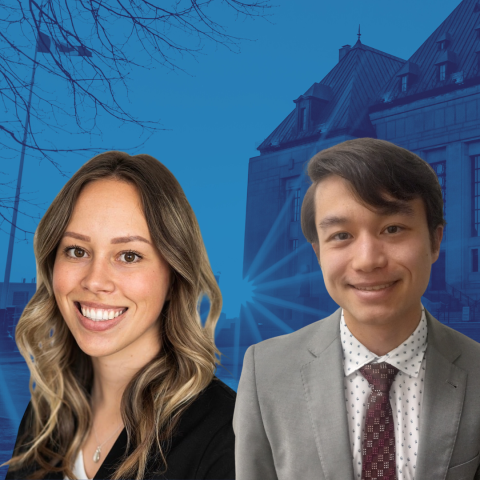
Both Queen’s Law recipients of the most recent appointments to Supreme Court of Canada clerkships had similar reactions when they heard the good news earlier this month: shock and disbelief.
“I was doing some course work when the call came,” says LLM student Abigail (Abby) Green. “It wasn’t from an Ottawa area code, so I had no idea who was on the other end of the line … but when I answered and Justice Michelle O’Bonsawin identified herself, I was so excited! I had to hold back my tears while I talked to her, then immediately started crying and called my mom,” she laughs now.
Green, a Mohawk member from Tyendinaga Mohawk Territory, had reached the interview stage when she applied last year, but wasn’t successful in her first attempt. Encouraged by mentors, she reapplied and felt that she’d done better this time. Still, it was “a complete shock” to learn of her selection, she says.
On that same Friday morning, William Lundy, Law’23, decided by 11 am that he, too, must have missed the cut for clerkship appointments. Then at 11:10, his phone rang at the Crown Attorney’s Office in Niagara, where he’s articling. It was Supreme Court Justice Nicholas Kasirer on the other end.
“He invited me to clerk with his chambers, and of course I said ‘Yes’,” Lundy exclaims. “I was overjoyed, but also a bit stunned. I actually thought my interview before the panel of judges could have gone better – I wasn’t expecting to get a call back!”
With applications for 2025-26 clerkships due this past January, the selection process unfolded quickly in March, says Green. “I interviewed via Microsoft Teams on a Monday and offers went out that Friday. You don’t apply to a specific judge… just hope your interviews go well and that one judge is interested!”
Being selected by O’Bonsawin is a dream come true, she continues. “When I applied, I knew it would be an absolute honour to serve the first Indigenous judge at the Supreme Court … I so was elated that she picked me!”
Recipient of the 2023 Dean’s Bronze Scholar Award (for the graduating student with the third-highest average in their final year), Lundy looks forward to providing Kasirer with “bench memos” that summarize the issues in cases under review and suggest how to resolve them. “The Supreme Court deals with areas where the law is often unclear,” he notes. “So you’re not just reading case law, you’re also researching secondary sources: trying to understand how the law should be clarified, or in some cases, developed.”
He credits Queen’s professors Nick Bala, Law’77, Benjamin Ewing, and Mary-Jo Maur, Law’85, LLM’93, for kindling his interest in areas of the law that are uncertain, or where current interpretations have created unfairness or injustice. He also credits Professor Jacob Weinrib for furthering his passion for constitutional law. “My goal is to be a prosecutor at the trial level – so this is a bit of a detour! – but I’m sure the clerkship will be an incredibly valuable experience,” Lundy says. Noting that the SCC often deals with cutting-edge criminal law issues, he adds: “I think it’s also helpful for a trial prosecutor to understand how judges at the highest level approach those issues and attempt to resolve them.”
It was her family and undergraduate degree in environmental science at Queen’s that steered Green toward a career in law. “I knew that I wanted to have more tools under my belt to effect change,” she says. “Law school seemed to be a good place to start.” After receiving her JD from the University of Ottawa in 2022, and then clerking at the Federal Court, she began an LLM in Indigenous Law at Queen’s last fall under two co-supervisors: Professor Lindsay Borrows, and RMC’s Associate Vice-Principal (Indigenous Knowledges and Learning) Danielle Lussier, who is cross-appointed to Queen’s Law.
“My whole path has been made possible by the ongoing support of my community and my mentors,” Green reflects. Envisioning her Supreme Court clerkship next year, she says she looks forward to assisting O’Bonsawin through both legal research and writing. “We’ll be working on complex questions of national importance” she says, enthusiastically. “It’s going to be an amazing experience!”
By Nancy Dorrance